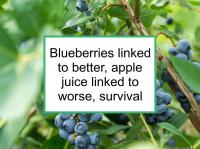While many studies have examined the links between diet and breast cancer risk, relatively few have examined the influence of post-diagnosis diet survival. While there is overlap between factors that affect breast cancer risk and risk of recurrence, drivers of risk are not identical at each stage of tumor initiation, growth and metastasis.
For example, breast cancer initiation, which is the result of changes in a single cell, does not involve angiogenesis (the formation of new blood vessels to supply nutrients to a tumor). On the other hand, growing tumors and metastases must establish a blood supply in order to grow beyond a tiny size. Certain foods such as blueberries and watercress contain compounds that have been shown to reduce angiogenesis.
Now a large new prospective study has reported on the associations between fruit and vegetable consumption and breast cancer recurrence. Among other findings, blueberry consumption was found to be linked to improved survival whereas apple juice intake was associated with worse outcome.
Leafy green & cruciferous vegetables
High leafy green and cruciferous vegetable intake was also linked to lower mortality among breast cancer survivors in the study. Below we list relevant vegetables, most of which are on our recommended foods list.
Latest research finds blueberries & apple juice affect survival
The prospective study referenced above was designed to investigate the links between fruit and vegetable consumption after diagnosis and survival (overall and breast cancer-specific). The study included 8,927 women with stage I–III breast cancer who had participated in the Nurses' Health Studies: NHS (1980–2010) and NHSII (1991–2011). Participants completed a validated food frequency questionnaire every four years through the end of follow up (2014 for the NHS and 2015 for the NHSII). The authors documented 2,521 deaths among the 8,927 women through the end of follow up, including 1,070 caused by breast cancer.
Each two servings per week of blueberries was found to be associated with 25% lower breast cancer-specific and 17% lower all-cause mortality. On the other hand, higher fruit juice consumption was associated with higher breast cancer-specific and all-cause mortality. Apple juice was largely responsible for these findings (orange juice was not linked to worse survival).
Total fruit and vegetable consumption was found to be linked to lower all-cause mortality, as was total vegetable consumption. These intakes were not associated with breast cancer-specific mortality. However the authors state that their findings suggest that higher vegetable consumption, particularly of leafy green and cruciferous vegetables, was linked to better overall survival among women with breast cancer. Total fruit consumption was not related to mortality (neither all-cause nor breast cancer-specific).
